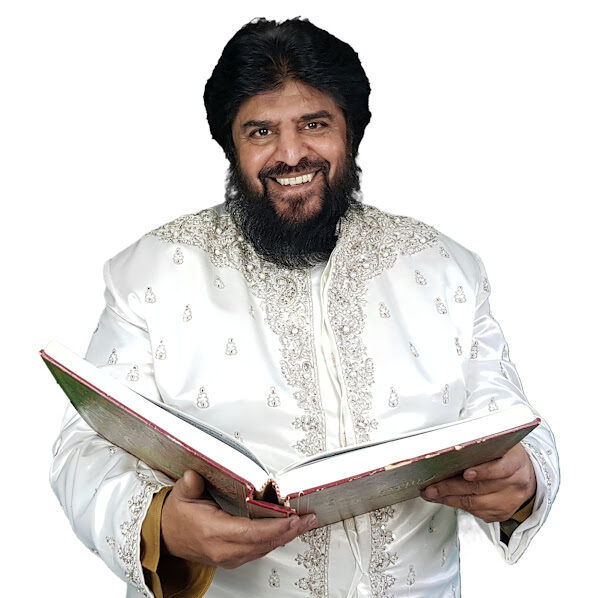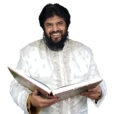THE QUR'AN
[ALLAH PRESERVED IT]
إِنَّا نَحۡنُ نَزَّلۡنَا ٱلذِّكۡرَ وَإِنَّا لَهُ ۥ لَحَـٰفِظُونَ (٩)
Surah Al-Hijr
Verily We: It is We Who have sent down the Dhikr (i.e. the Qur’ân) and surely, We will guard it (from corruption)(9)

IS QUR'AN COPIED FROM THE BIBLE?
بِسْمِ اللهِ الرَّحْمٰنِ الرَّحِيْمِ
(In the name of Allah, the Most Gracious, the Most Merciful).
POSSIBILITY #2: The Prophet used previous books like the Bible or the Torah to write the Qur’an.
This possibility could easily be refuted because the prophet was illiterate which means that he could not read or write. And even if we assume that he was not illiterate where would he have got hold of the Bible or the Torah in Arabic? Did you know that the first Arabic translation of the bible was made in the 9th century which is a hundred years after the death of Prophet Muhammad (peace be upon him), then how could he have read it?
Added to that, until around the 18th century the church was essentially hiding the Bible from common people and forbade its translation so the bible was not just readily available let alone a translation there are. This leads us with no other conclusion than that the prophet could not have used the previous books to write the Qur’an. This possibility is off the table. Let’s move to the possibility number 3….
Let’s break down the key points in more detail:
Prophet’s Illiteracy:
Emphasizing that the Prophet Muhammad (peace be upon him) was historically documented as illiterate, meaning he could neither read nor write. This fact is well-established in Islamic tradition.
Accessibility to Previous Scriptures:
Highlighting the logistical challenge of accessing the Bible or the Torah in Arabic during the Prophet’s time. Mention that the first Arabic translation of the Bible was created in the 9th century, several hundred years after the Prophet’s death.
Historical Context of Bible Availability:
Addressing the historical context, noting that until the 18th century, the Church restricted access to the Bible and forbade its translation. This was done to control interpretation and limit access to the scriptures.
Time Discrepancy:
Pointing out the chronological gap – the Bible’s availability in Arabic and the general availability of the Bible – both of which occurred after the death of Prophet Muhammad (peace be upon him).
Conclusion:
Summarizing the points made to conclude that considering the Prophet’s illiteracy, the absence of Arabic translations of the Bible or the Torah during his time, and the historical restrictions on Bible access, it is implausible that he could have used these previous books to compose the Qur’an. In essence, this argument solidly dismisses the possibility of the Prophet Muhammad (peace be upon him) relying on the Bible or the Torah to create the Qur’an, providing a clear rationale for why this scenario is not feasible.
The evidence of Prophet Muhammad’s (peace be upon him) illiteracy is firmly rooted in Islamic tradition and is explicitly mentioned in both the Qur’an and various hadiths (sayings and actions of the Prophet). Here are references to support this claim:
Evidence from the Qur’an:
Surah Al-Ankabut (29:48-49):
“And you did not recite before it any scripture, nor did you inscribe one with your right hand. Otherwise the falsifiers would have had [cause for] doubt.”
This verse underscores that the Prophet Muhammad (peace be upon him) did not read or write any scripture before the revelation of the Qur’an.
Evidence from Hadith:
Sahih al-Bukhari:
In multiple hadiths found in Sahih al-Bukhari, it is narrated that the Prophet Muhammad (peace be upon him) was illiterate. For example:
عَنِ ابْنِ عَبَّاسٍ ـ رضى الله عنهما ـ قَالَ كَانَ النَّبِيُّ صلى الله عليه وسلم أَجْوَدَ النَّاسِ، وَأَجْوَدُ مَا يَكُونُ فِي رَمَضَانَ، حِينَ يَلْقَاهُ جِبْرِيلُ، وَكَانَ جِبْرِيلُ ـ عَلَيْهِ السَّلاَمُ ـ يَلْقَاهُ فِي كُلِّ لَيْلَةٍ مِنْ رَمَضَانَ، فَيُدَارِسُهُ الْقُرْآنَ فَلَرَسُولُ اللَّهِ صلى الله عليه وسلم أَجْوَدُ بِالْخَيْرِ مِنَ الرِّيحِ الْمُرْسَلَةِ.
Narrated Ibn `Abbas: The Prophet (ﷺ) was the most generous of all the people, and he used to become more generous in Ramadan when Gabriel met him. Gabriel used to meet him every night during Ramadan to revise the Qur’an with him. Allah’s Messenger (ﷺ) then used to be more generous than the fast wind.
Sahih al-Bukhari 3554
Chapter 23: The description of the Prophet (saws), Book 61: Virtues and Merits of the Prophet (pbuh) and his Companions
https://sunnah.com/bukhari:3554
Sahih Muslim:
Similar statements regarding the Prophet’s illiteracy can be found in Sahih Muslim. For instance:
“Narrated by ‘Aisha: (the wife of the Prophet) Allah’s Apostle (peace be upon him) said, ‘Do good deeds properly, sincerely and moderately, and receive good news because one’s good deeds will not make him enter Paradise.’ They asked, ‘Even you, O Allah’s Apostle?’ He said, ‘Even I, unless and until Allah bestows His pardon and Mercy on me.'”
These references clearly establish that the Prophet Muhammad (peace be upon him) was illiterate, and this fact is consistent across various Islamic sources. The Qur’an itself attests to his lack of previous knowledge of scriptures, reinforcing the divine origin of the revelations he received.
Narrated Ibn `Umar: The Prophet (ﷺ) said, “We are an illiterate nation; we neither write, nor know accounts. The month is like this and this, i.e. sometimes of 29 days and sometimes of thirty days.”
Sahih al-Bukhari 1913
Chapter 13: “We neither write nor know accounts.”, Book 30: Fasting
While the Qur’an and Hadith (sayings and actions of Prophet Muhammad, peace be upon him) don’t explicitly mention the absence of Arabic translations of the Bible or Torah during the Prophet’s time, they provide some broader context about the accessibility of scriptures.
Qur’anic Verses:
The Qur’an acknowledges the existence of previous scriptures, referring to them as revelations sent to earlier prophets. However, it does not specify the availability of these scriptures in Arabic during the time of Prophet Muhammad (peace be upon him).
Qur’an 2:136: “Say, [O believers], ‘We have believed in Allah and what has been revealed to us and what has been revealed to Abraham and Ishmael and Isaac and Jacob and the Descendants, and in what was given to Moses and Jesus and to the prophets from their Lord. We make no distinction between any of them, and we are Muslims [in submission] to Him.'”
Hadith:
There are Hadiths that emphasize the illiteracy of Prophet Muhammad (peace be upon him). These emphasize that he did not read or write, which further underscores the challenge of accessing previous scriptures.
Sahih Bukhari, Book 3, Hadith 118: “Narrated by Abdullah bin Umar: Allah’s Messenger (ﷺ) said: ‘While I was sleeping, I was given a bowl full of milk (in a dream), and I drank of it to my fill till I noticed its wetness coming out of my limbs. Then I gave the rest of it to ‘Umar bin Al-Khattab.'”
Historical Context:
Historical records and Islamic scholars confirm that the first complete Arabic translation of the Bible, known as the “Biblia Arabica,” was not completed until the 9th century CE.
This historical fact aligns with the argument that the Prophet Muhammad (peace be upon him) could not have had access to Arabic translations of the Bible during his lifetime.
While the Qur’an and Hadith may not explicitly detail the absence of Arabic translations of the Bible or Torah during the Prophet’s time, they indirectly support the argument by providing information about the Prophet’s illiteracy and the general absence of Arabic translations of such scriptures during that era.
“Indeed, it is We who sent down the Qur’an and indeed, We will be its guardian.”
This verse indicates that Allah has taken the responsibility of preserving the Qur’an, ensuring its purity and integrity.
While the Qur’an doesn’t provide a detailed historical account of the Church’s actions, it does encourage seeking knowledge and understanding. The Hadith literature, which includes the sayings and actions of Prophet Muhammad (peace be upon him), contains guidance on acquiring knowledge and wisdom.
In a Hadith narrated by Abdullah ibn Amr, the Prophet Muhammad (peace be upon him) is reported to have said:
“Seek knowledge from the cradle to the grave.”
This Hadith emphasizes the importance of acquiring knowledge throughout one’s life. It encourages Muslims to seek understanding and wisdom from various sources.
While the Qur’an and Hadith don’t explicitly delve into the historical context of the Church’s actions regarding the Bible, they provide a broader framework for seeking knowledge and emphasize the preservation of the Qur’an as the ultimate source of guidance for Muslims. The historical context of the Church’s restrictions on the Bible would need to be explored through other historical and scholarly sources

